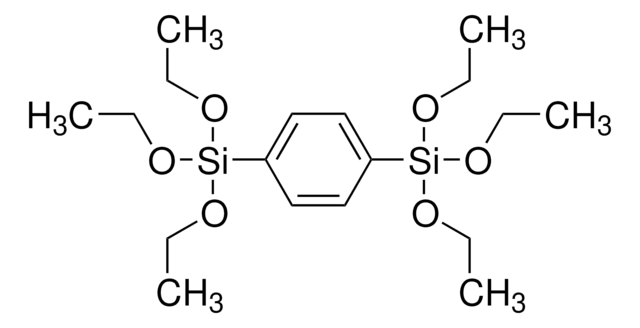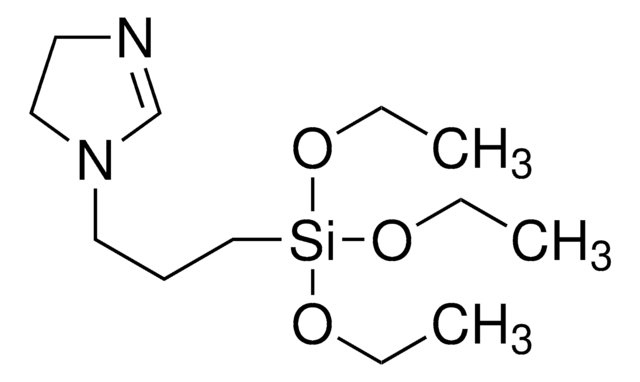638102
4,4′-Bis(triethoxysilyl)-1,1′-biphenyl
≥90% (VPCC)
Synonym(s):
4,4′-Bis(triethoxysilyl)biphenyl
About This Item
Recommended Products
Assay
≥90% (VPCC)
bp
203-206 °C/0.3 mmHg (lit.)
density
1.047 g/mL at 25 °C (lit.)
SMILES string
CCO[Si](OCC)(OCC)c1ccc(cc1)-c2ccc(cc2)[Si](OCC)(OCC)OCC
InChI
1S/C24H38O6Si2/c1-7-25-31(26-8-2,27-9-3)23-17-13-21(14-18-23)22-15-19-24(20-16-22)32(28-10-4,29-11-5)30-12-6/h13-20H,7-12H2,1-6H3
InChI key
KENDGHJJHKCUNB-UHFFFAOYSA-N
Related Categories
Application
BTESB can also be utilized as a precursor to prepare:
- Helical 4, 4′-biphenylene-silica nanotubes and nanoribbons using 3-aminopropyltrimethoxysilane as a co-structure-directing agent.
- Biphenyl-bridged alkoxysilane-based crosslinked polyalkoxysilane by condensation with linear aliphatic diols.
- Biphenylene-bridged silsesquioxane thin films by the sol-gel method.
Hazard Statements
Hazard Classifications
Aquatic Chronic 4
Storage Class Code
10 - Combustible liquids
WGK
WGK 3
Flash Point(F)
>230.0 °F - closed cup
Flash Point(C)
> 110 °C - closed cup
Personal Protective Equipment
Certificates of Analysis (COA)
Search for Certificates of Analysis (COA) by entering the products Lot/Batch Number. Lot and Batch Numbers can be found on a product’s label following the words ‘Lot’ or ‘Batch’.
Already Own This Product?
Find documentation for the products that you have recently purchased in the Document Library.
Customers Also Viewed
Our team of scientists has experience in all areas of research including Life Science, Material Science, Chemical Synthesis, Chromatography, Analytical and many others.
Contact Technical Service


![Bis[3-(triethoxysilyl)propyl] tetrasulfide technical, ≥90% (NMR)](/deepweb/assets/sigmaaldrich/product/structures/242/790/625f5cba-32bd-4acf-a3be-e119e9cf844f/640/625f5cba-32bd-4acf-a3be-e119e9cf844f.png)








